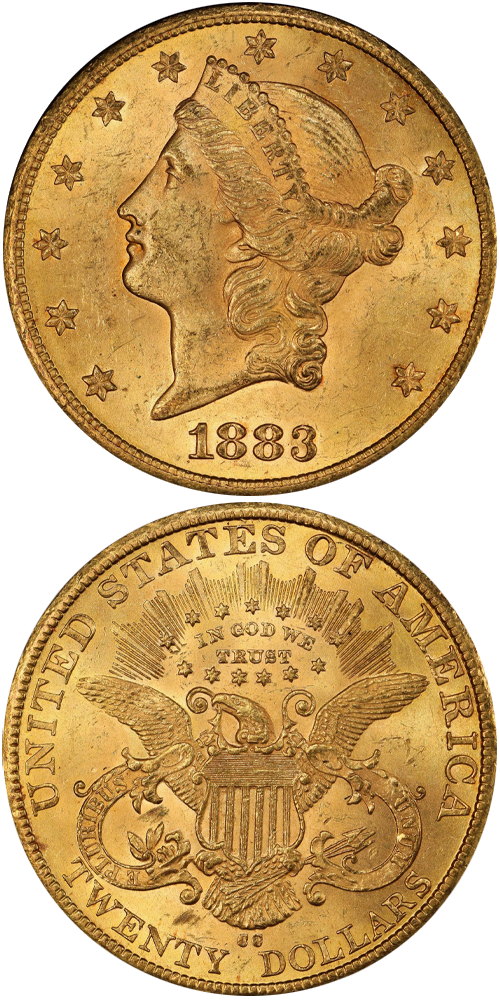1883-CC Liberty Head Double Eagle
Jeff Ambio: The Carson City Mint employed two obverse dies and a single reverse die to strike all known 1883-CC Liberty double eagles. The obverse of Winter 2 is readily identifiable by the presence of a small, raised die dot immediately to the right of the digit 3 in the date. On the reverse of this issue, the first C is centered over the space between the words TWENTY and DOLLARS and the second C is over the extreme left edge of the letter D in DOLLARS. There is some light fill within the opening of both Cs in the mintmark.
As with the 1882-CC, the 1883-CC was produced to a high standard of quality and, in the finer circulated and Mint State grades, is among the most consistently sharp double eagles from this Mint.
Rusty Goe: In 1883, it appeared as if local miners were delivering a large percentage of their takings to Carson City, as the mint there posted gold coinage production figures near the $1.2 million mark, for the second year in a row. So long as the Treasury provided the Carson Mint with enough silver to keep making those Bland-Allison Act dollars, and the region's miners sent whatever amounts of gold they dug up, the plant would continue to turn out coins. Political supporters also helped.
As the race for Nevada's U.S. senator seat, to be hotly contested in 1884, saw the first sparks fly in fall 1883, newspapers in northwestern Nevada chose sides. Carson City's Appeal showed great support for the incumbent senator, John. P. Jones, Likewise, Reno's Nevada State Journal favored Jones. In October 1883, the Journal showcased the many great things the senator had accomplished for the state. The Appeal published the Journal's comments, especially the ones about the local mint. "Mr. Jones had managed to keep the Carson Mint in Nevada greatly to the benefit of its mining interests..."
An anonymous subscriber to Carson City's Tribune, took exception to the Journal's claims about Jones's role as the savior of the local mint. In an October 9, 1883 editorial, someone who signed his letter as "Justice," insisted that saying Senator Jones had prevented the abolition of the Carson Mint was false, Claiming to have firsthand information. "Justice" claimed that Nevada's former U.S. House representative William Woodburn's "personal effort and influence" in his defense of the local mint had saved it, and had persuaded Congress "to reinstate the appropriation."
Woodburn would go on to win his reelection bid for representative in the U.S. House in 1884, after an eight-year hiatus since his last term. And Jones would win again in 1884, and go on to serve as a U.S. senator from Nevada until 1903. No proof of "Justice's" claims ever surfaced. Jones and Woodburn most certainly knew the full story.
Coiner Dague started up his coin presses in January 1883 and by annual cleanup time, he had delivered 35,692 $20 gold pieces, almost as many as he had turned out in 1882. Coinage of double eagles continued in every month except October, which caused the July-December total to slip to 24,270 pieces, the total for the year exceeding 1882's output by more than 20,000 pieces.
The 1883-CC double eagle is another one of those Carson City gold coin issues where we see a survival rate of three percent or so of the original mintage figure. A sufficient supply of Mint State examples is available.
Q. David Bowers: I estimate that about 1,500 circulated examples are in numismatic hands, making this one of the more popular, more easily collectible Carson City double eagles. EF and AU coins abound. Regarding higher-level coins, most are in or near the MS-60 classification.
The example to the left was sold by Stack's Bowers Galleries in the Fairmont Collection, Hendricks Set, where it realized $84,000.






